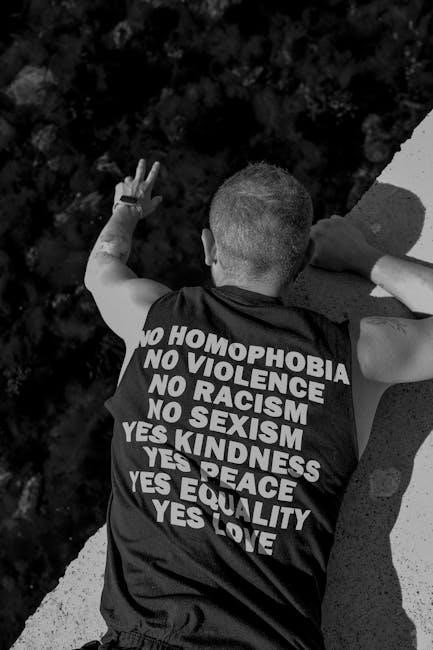hunger roxane gay pdf

Roxane Gay’s Hunger: A Memoir of (My) Body is a raw, unflinching exploration of body image, trauma, and societal perceptions of obesity. The memoir delves into her personal journey of using food as a coping mechanism for emotional pain and her struggle to find self-acceptance in a world that often marginalizes those who are overweight. Gay’s candid narrative offers a powerful commentary on the complexities of hunger, both physical and emotional, and the long path toward healing and self-care.
1.1 Overview of the Memoir

Hunger: A Memoir of (My) Body by Roxane Gay is a deeply personal and unflinching account of her experiences with body image, weight, and societal perceptions of obesity. The memoir explores her complex relationship with food, which serves as both a source of comfort and a means of coping with trauma. Gay recounts her childhood, the devastating act of violence that shaped her relationship with her body, and her struggles with self-acceptance in a world that often marginalizes those who are overweight. Unlike traditional memoirs about weight loss or triumph, Hunger offers a raw, honest narrative about the emotional and psychological toll of living in a body that society often judges or rejects. It is a powerful exploration of hunger—both physical and emotional—and the resilience required to navigate a world that frequently seeks to erase or diminish those who do not conform to its ideals.
1.2 Author Background: Roxane Gay
Roxane Gay is a prominent American author, educator, and commentator known for her insightful and unapologetic writings on topics such as feminism, body image, and identity. Born in Haiti and raised in the United States, Gay’s experiences with race, gender, and body politics deeply influence her work. She gained widespread recognition with her essay collection Bad Feminist, which established her as a leading voice in contemporary feminist literature. Gay’s writing often reflects her personal struggles, including her journey with weight, self-acceptance, and societal expectations. Her work is celebrated for its candor, vulnerability, and ability to spark critical conversations about marginalized identities and the human condition.
1.3 Importance of the Topic
The topic of body image, trauma, and societal perceptions of obesity, as explored in Hunger, holds significant importance in contemporary conversations about identity and mental health. Roxane Gay’s memoir sheds light on the often-stigmatized experiences of individuals struggling with weight and self-acceptance, offering a platform for marginalized voices. By addressing these issues with raw honesty, Gay challenges societal norms and encourages readers to confront their own biases. The memoir also underscores the intersectionality of body politics, race, gender, and class, making it a vital contribution to discussions on inclusivity and representation. Its relevance lies in its ability to spark empathy and foster understanding, highlighting the urgent need for a more compassionate dialogue around body image and mental health in modern society.

Themes in “Hunger”
Roxane Gay’s Hunger explores themes of body image, trauma, societal perceptions of obesity, food as comfort, and the struggle for self-acceptance, offering a raw perspective on identity.
2.1 Body Image and Self-Perception
In Hunger, Roxane Gay examines how societal norms and personal trauma shape body image. She reflects on her journey of self-perception, grappling with feelings of shame and invisibility, while challenging the toxic expectations imposed on bodies. Gay’s narrative confronts the internalized stigma of being in a fat body, offering a raw and vulnerable account of how negative self-perception is both deeply personal and universally relatable. Her exploration of body image is a powerful critique of how culture influences self-worth, urging readers to reconsider their assumptions about beauty and identity.
2.2 Trauma and Its Impact on Eating Habits
Roxane Gay’s Hunger deeply explores how traumatic experiences shape eating habits and relationships with food. She recounts how a devastating act of violence in her youth led to using food as a coping mechanism, creating a complex bond between emotional pain and physical hunger. The memoir reveals how trauma can distort perceptions of hunger and fullness, turning food into both a source of comfort and a means of self-protection. Gay’s narrative illustrates the long-term effects of such experiences, highlighting the struggle to distinguish between emotional and physical needs. Her journey underscores the profound interconnection between trauma, eating habits, and the body, offering a poignant reflection on survival and the search for healing.

2.3 Societal Perceptions of Obesity
Roxane Gay’s Hunger critiques societal perceptions of obesity, highlighting the stigma and marginalization faced by those deemed “too big.” She confronts the cultural narrative that equates thinness with virtue and fatness with failure, challenging the notion that larger bodies are inherently less worthy. Gay shares her experiences of being perceived as “other,” emphasizing how societal fatphobia perpetuates shame and exclusion. Her memoir underscores the emotional toll of constant judgment and the struggle to reclaim dignity in a world that often dehumanizes fat individuals. By sharing her story, Gay advocates for a more inclusive understanding of body diversity, urging readers to question and dismantle harmful stereotypes surrounding obesity. Her narrative serves as a powerful rebuke to the systemic discrimination faced by those in larger bodies.
2.4 Food as a Source of Comfort and Struggle
In Hunger, Roxane Gay portrays food as both a source of solace and a site of profound struggle. Following a traumatic experience in her youth, Gay turned to food as a means of coping with emotional pain, using it to fill the void left by her suffering. However, this reliance on food also became a source of internal conflict, as it led to weight gain and further societal judgment. Gay’s relationship with food is complex—while it provided temporary comfort, it also perpetuated a cycle of guilt and self-criticism. Her memoir examines the duality of food as both a necessity for survival and a symbol of deeper emotional needs, highlighting the tension between nourishment and self-destruction. This exploration offers a deeply personal and nuanced perspective on the role of food in her life.
2.5 Identity and Self-Acceptance
In Hunger, Roxane Gay grapples with the intersection of identity and self-acceptance, particularly in relation to her body. Her memoir is a poignant exploration of how societal expectations and personal trauma have shaped her sense of self. Gay’s journey is marked by a struggle to reconcile her internalized shame with her desire for visibility and acceptance. She reflects on how her body, often viewed through the lens of societal judgment, has become a symbol of both resilience and vulnerability. Through her narrative, Gay challenges the notion of a singular or “correct” way to exist in one’s body, advocating instead for a more compassionate understanding of oneself. Her memoir ultimately becomes a powerful testament to the complexity of identity and the ongoing quest for self-acceptance in a world that often seeks to define and limit individuals based on their appearance.

Roxane Gay’s Personal Journey
Roxane Gay’s personal journey is marked by resilience and self-reflection. Her memoir recounts a life shaped by trauma, food, and societal judgment, highlighting her path toward healing and self-awareness.
3.1 Childhood and the Onset of Trauma
Roxane Gay’s childhood was profoundly shaped by a devastating act of violence at the age of twelve, which became a turning point in her life. This traumatic event left her with deep emotional scars and a loss of safety, leading her to seek solace in food. She vividly recounts how her relationship with her body and food began to change during this period, marking the onset of her struggles with weight and self-image. Gay’s narrative paints a poignant picture of how childhood trauma can manifest in physical form, setting the stage for a lifetime of challenges and self-discovery. Her story underscores the lasting impact of early experiences on one’s body and psyche.
3.2 The Role of Food in Coping with Trauma
In Hunger, Roxane Gay reveals how food became her primary coping mechanism after experiencing childhood trauma. She describes eating as a way to fill the emotional void and protect herself from further harm. Gay’s consumption of food was not about nourishment but about survival, as she sought to make herself “big” and less vulnerable. This pattern of eating led to significant weight gain, which she discusses with unflinching honesty. Gay’s relationship with food is complex, oscillating between comfort and conflict, as she struggles to reconcile her need for emotional solace with the societal stigma attached to her body size. Her narrative highlights the enduring impact of trauma on eating habits and the challenges of breaking this cycle.
3.3 The Struggle with Weight and Society’s Reaction
Roxane Gay’s weight has long been a subject of scrutiny and judgment, both publicly and privately. In Hunger, she confronts the societal stigma attached to her body size, detailing how fatphobia has shaped her experiences. Gay describes the painful reality of being marginalized and dehumanized because of her weight, from cruel comments to systemic discrimination in healthcare and employment. Despite the challenges, she resists the pressure to conform to societal expectations, advocating for self-acceptance and challenging the notion that bodies must fit narrow standards of acceptability. Gay’s narrative is both a personal testament to resilience and a broader critique of a culture that equates worth with weight, emphasizing the need for inclusivity and understanding.

The Societal Context of “Hunger”

Hunger critiques societal fatphobia, discrimination, and the media’s role in shaping negative perceptions of obesity, highlighting how systemic biases exacerbate personal struggles with body image and acceptance.
4.1 Fatphobia and Discrimination
Roxane Gay’s Hunger vividly portrays the pervasive fatphobia and discrimination she faced, illustrating how societal prejudice against obesity perpetuates feelings of shame and isolation. Gay recounts experiences of being marginalized, judged, and excluded, emphasizing how cultural attitudes toward body size are deeply rooted in bias and misunderstanding. The memoir highlights the emotional toll of constant scrutiny and the internalized self-loathing that arises from living in a body that does not conform to societal ideals. By sharing her struggles, Gay confronts the systemic discrimination faced by fat individuals, challenging readers to recognize and dismantle these harmful stereotypes.
4.2 Gender and Body Image

Roxane Gay’s Hunger deeply explores the intersection of gender and body image, revealing how societal expectations of femininity exacerbate her struggles with weight and self-perception. Gay reflects on how women’s bodies are often scrutinized and policed, with beauty standards perpetuating unrealistic ideals. Her experiences as a woman navigating a world that shames fatness highlight the gendered nature of body image issues. Gay’s narrative critiques the cultural conditioning that equates thinness with worthiness, particularly for women, and how this contributes to internalized shame and self-loathing. By sharing her journey, she challenges these norms, offering a powerful critique of how gender shapes perceptions of the body and identity. Her story underscores the urgent need for a more inclusive understanding of beauty and self-worth.
4.3 The Role of Media in Shaping Perceptions
Roxane Gay’s Hunger examines how media perpetuates harmful stereotypes and unrealistic beauty standards, influencing societal perceptions of body image. Gay discusses how the constant bombardment of idealized bodies in media fosters self-doubt and low self-esteem, particularly among women. She critiques the lack of representation for diverse body types, emphasizing how this exclusion marginalizes individuals who do not conform to these narrow standards. Gay also highlights how media often sensationalizes weight loss stories, promoting a narrative of triumph that oversimplifies the complexities of body image struggles. By addressing these issues, Gay challenges readers to critically evaluate the media’s role in shaping their perceptions and to seek a more inclusive and compassionate understanding of all bodies. Her insights underscore the media’s profound impact on self-image and societal attitudes toward obesity.
4.4 Class and Access to Healthcare
In Hunger, Roxane Gay underscores the intersection of class and access to healthcare, highlighting how socioeconomic status impacts opportunities for wellness. She discusses how financial barriers limit access to quality healthcare, particularly for marginalized communities, exacerbating struggles with weight and mental health. Gay reflects on her own experiences, noting the lack of affordable resources for addressing trauma and body image issues. She critiques systemic inequalities that prevent many from accessing proper nutrition, mental health support, and medical care. This disparity perpetuates cycles of poverty and poor health outcomes, further marginalizing already vulnerable populations. Gay’s narrative emphasizes the need for equitable healthcare access and challenges societal structures that fail to support those in need. Her insights reveal the profound impact of class on health and well-being, urging a more compassionate and inclusive approach to healthcare.

The Reception of “Hunger”
Hunger received widespread critical acclaim for its raw honesty and profound insights. It became a New York Times bestseller, sparking essential conversations about body image, trauma, and identity. The memoir resonated deeply with readers, earning praise for its unflinching portrayal of personal struggle and societal critique, solidifying Roxane Gay’s role as a influential voice in contemporary literature.
5.1 Critical Acclaim and Reviews
Hunger garnered widespread critical acclaim for its unflinching honesty and emotional depth. Reviewers praised Roxane Gay’s ability to confront societal norms and personal trauma with raw vulnerability. The memoir was celebrated for its nuanced exploration of food, weight, and self-image, offering a powerful commentary on body positivity and mental health. Many noted its departure from traditional weight-loss narratives, instead presenting a deeply personal and relatable account of struggle and resilience. The book was hailed as a necessary contribution to conversations about identity and body politics, further cementing Gay’s reputation as a bold and influential writer. Its emotional resonance and fearless storytelling earned it a place as a New York Times bestseller, solidifying its impact on contemporary literature.
5.2 Cultural Impact and Conversations Started
Hunger has sparked significant cultural conversations about body image, trauma, and societal expectations. Roxane Gay’s unflinching narrative has challenged traditional notions of weight loss and self-improvement, offering a more nuanced exploration of what it means to live in a body society often seeks to control. The memoir has resonated deeply with readers, fostering discussions about fatphobia, mental health, and the complexities of identity. By sharing her story, Gay has empowered others to confront their own struggles with body image and trauma, creating a ripple effect in social media, book clubs, and public discourse. Her work has become a cornerstone in conversations about body positivity and self-acceptance, inspiring a more empathetic understanding of the diverse human experience.
5.3 Comparisons to Other Memoirs
Hunger is often compared to other memoirs that explore themes of body image, trauma, and self-discovery, yet it stands apart for its unflinching honesty and refusal to conform to traditional narratives of triumph. Unlike many memoirs that follow a linear journey of overcoming adversity, Hunger presents a raw, ongoing struggle, offering no neat resolutions. Roxane Gay’s voice is both deeply personal and universally relatable, making her work a benchmark for contemporary memoirs addressing similar themes. While some critics draw parallels to works like The Body Is Not an Apology by Sonya Renee Taylor, Gay’s unique perspective on fatness, trauma, and societal expectations sets Hunger apart. The memoir’s impact lies in its ability to challenge and expand the boundaries of how body image and identity are explored in literature.

The Significance of “Hunger” in Modern Literature
Hunger stands as a pivotal work in modern literature, offering a fearless exploration of body image, trauma, and identity. Its raw honesty and unflinching narrative have sparked critical conversations about societal norms and self-acceptance, leaving a lasting impact on contemporary feminist and memoir writing.
6.1 Breaking the Silence on Body Image Issues
Roxane Gay’s Hunger courageously breaks the silence on body image issues, challenging societal norms and stigma surrounding obesity. With unflinching honesty, she shares her personal struggles with weight, trauma, and self-perception, offering a deeply human perspective often marginalized in public discourse. Gay’s narrative not only confronts the emotional and psychological complexities of body image but also critiques the cultural obsession with thinness and the judgment faced by those who do not conform. By voicing her experiences, she empowers others to speak openly about their own bodies and challenges the shame and invisibility often imposed on individuals deemed “unacceptable” by societal standards. Her work fosters a necessary conversation about body positivity, self-acceptance, and the need for a more inclusive understanding of beauty and worth.
6.2 The Memoir as a Tool for Social Change
Roxane Gay’s Hunger transcends personal narrative, serving as a powerful tool for social change by addressing systemic issues like fatphobia, gender inequality, and mental health stigma. Through her unflinching account of her experiences, Gay challenges readers to confront the societal structures that perpetuate discrimination and marginalization of obese individuals. Her memoir sparks critical conversations about the intersectionality of body image, race, class, and gender, urging a reevaluation of cultural norms. By sharing her story, Gay empowers readers to advocate for a more inclusive and compassionate society, demonstrating how personal narratives can drive collective action and foster meaningful change. Her work has become a catalyst for broader discussions on social justice, proving the memoir’s potential to inspire and transform.
6.3 Roxane Gay’s Contribution to Feminist Literature
Roxane Gay’s Hunger: A Memoir of (My) Body stands as a significant contribution to feminist literature, offering a nuanced exploration of body image, trauma, and identity. By centering her own experiences as a Black, queer, and fat woman, Gay challenges traditional narratives that often marginalize or erase such voices. Her work intersects with feminist theory, particularly in its critique of societal beauty standards and the objectification of women’s bodies. Gay’s unflinching honesty and refusal to conform to expectations of how women should look or behave make her a pivotal figure in contemporary feminist discourse. Through Hunger, she not only shares her personal story but also amplifies the voices of others who have been silenced, furthering the feminist mission of empowerment and representation. Her writing has become a cornerstone of modern feminist thought and activism.
Hunger: A Memoir of (My) Body is a powerful, honest account of Roxane Gay’s journey through trauma, body image, and societal expectations. It leaves a lasting impact by sparking essential conversations about identity, self-acceptance, and resilience, cementing its influence in feminist literature.
7.1 Summary of Key Points
Hunger: A Memoir of (My) Body by Roxane Gay is a deeply personal exploration of body image, trauma, and societal perceptions of obesity. Gay shares her journey of using food as a coping mechanism for emotional pain, stemming from a traumatic event in her youth. The memoir challenges stereotypes surrounding weight and fatness, offering a raw and unflinching account of her experiences. It highlights the societal pressures and fatphobia that contribute to her struggles, while also delving into themes of identity, self-acceptance, and resilience. Gay’s narrative is not a triumphant tale of weight loss but a candid reflection on her relationship with her body and food. The book underscores the importance of understanding and addressing the emotional and psychological roots of eating habits, making it a significant contribution to conversations about body image and feminism.
7.2 Final Thoughts on the Memoir’s Impact
Roxane Gay’s Hunger leaves a profound impact by breaking the silence on body image issues and challenging societal norms. This memoir, available as a PDF for readers worldwide, offers a raw and unflinching account of her personal journey. Gay’s honesty about her struggles with weight, trauma, and self-acceptance resonates deeply, making the book a powerful tool for social change. It sparks essential conversations about fatphobia, gender, and identity, while also highlighting the emotional and psychological aspects of hunger. Gay’s work not only contributes to feminist literature but also empowers readers to confront their own struggles with body image and societal expectations. The memoir’s unflinching candor ensures its lasting relevance in modern literary discourse.
7.3 The Lasting Legacy of “Hunger”
Roxane Gay’s Hunger has cemented its place as a groundbreaking memoir, leaving a lasting legacy in literature and advocacy. Its unflinching exploration of body image, trauma, and societal perceptions has sparked crucial conversations about fatphobia and self-acceptance. As a widely accessible PDF, the book has reached a global audience, further amplifying its impact. Gay’s work has redefined how memoirs address sensitive topics, offering a raw and honest perspective that resonates with readers. By challenging stereotypes and advocating for inclusivity, Hunger has become a cornerstone of feminist literature, empowering marginalized voices and inspiring future writers. Its legacy lies in its ability to transcend personal narrative, becoming a powerful tool for cultural and social change, ensuring its relevance for years to come.